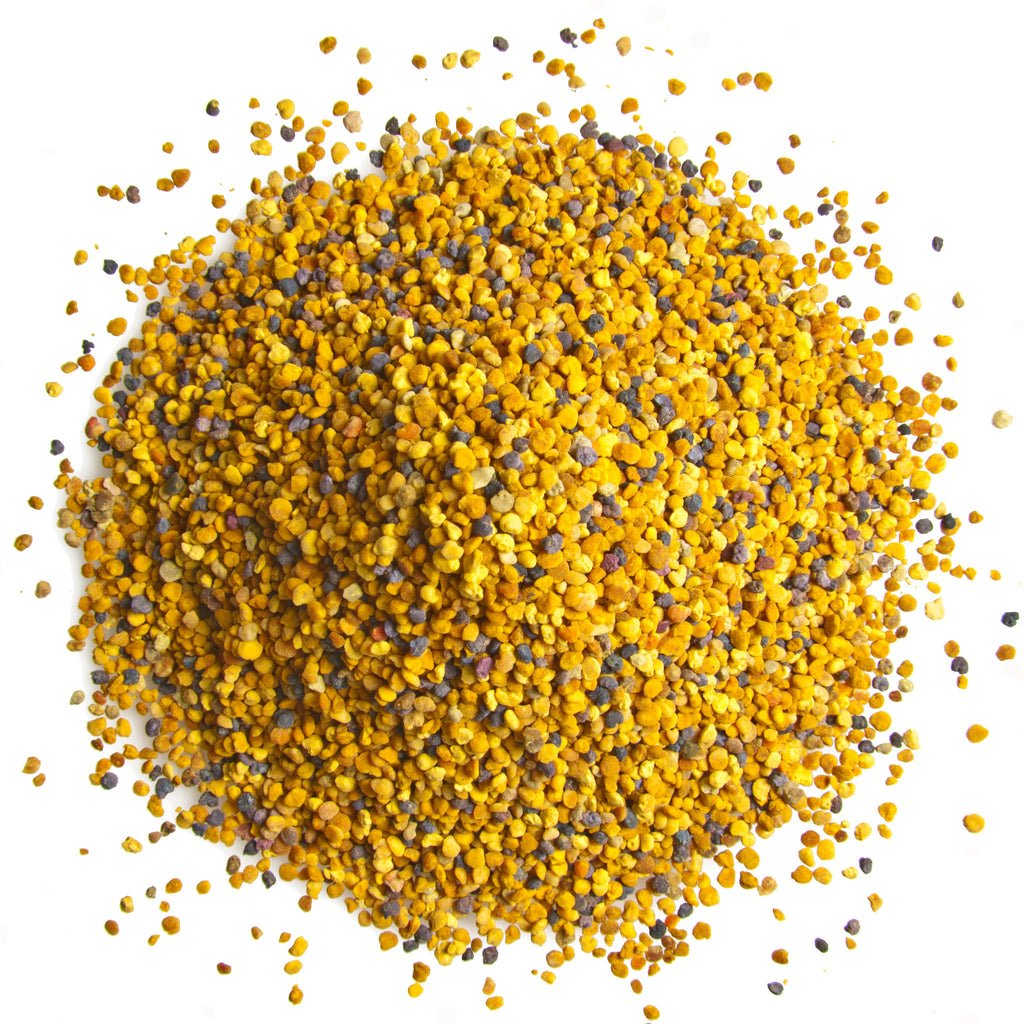Bee Pollen Granules
Bee pollen refers to the flower pollen that collects on the legs and bodies of worker bees. It can also include some nectar and bee saliva. Pollens come from many plants, so the contents of bee pollen can vary significantly. Don’t confuse bee pollen with bee venom, honey, or royal jelly.
People take bee pollen for nutrition; as an appetite stimulant; to improve stamina and athletic performance; and for premature aging, premenstrual syndrome (PMS), hay fever (allergic rhinitis), mouth sores, joint pain (rheumatism), painful urination, prostate conditions, and radiation sickness.
It is also used for weight loss, bleeding problems including coughing or vomiting blood, bloody diarrhea, nosebleed, brain hemorrhage, and menstrual problems.
Bee pollen is also used for gastrointestinal (GI) problems including constipation, diarrhea, enteritis, and colitis. Some people use bee pollen as a general tonic, to increase urine flow, and for alcohol intoxication.
Bee pollen is used topically for skin care in skin softening products, and for treating eczema, pimples, and diaper rash.
Disclaimer: Please note that Rooted Kitchen is a supplier of natural dried herbs, spices and ingredients. Information on this website is compiled from various sources for educational purposes only and should not be used to treat or diagnose any medical condition. Please consult your doctor or a qualified healthcare professional for additional insight.
Bee pollen refers to the flower pollen that collects on the legs and bodies of worker bees. It can also include some nectar and bee saliva. Pollens come from many plants, so the contents of bee pollen can vary significantly. Don’t confuse bee pollen with bee venom, honey, or royal jelly.
People take bee pollen for nutrition; as an appetite stimulant; to improve stamina and athletic performance; and for premature aging, premenstrual syndrome (PMS), hay fever (allergic rhinitis), mouth sores, joint pain (rheumatism), painful urination, prostate conditions, and radiation sickness.
It is also used for weight loss, bleeding problems including coughing or vomiting blood, bloody diarrhea, nosebleed, brain hemorrhage, and menstrual problems.
Bee pollen is also used for gastrointestinal (GI) problems including constipation, diarrhea, enteritis, and colitis. Some people use bee pollen as a general tonic, to increase urine flow, and for alcohol intoxication.
Bee pollen is used topically for skin care in skin softening products, and for treating eczema, pimples, and diaper rash.
Disclaimer: Please note that Rooted Kitchen is a supplier of natural dried herbs, spices and ingredients. Information on this website is compiled from various sources for educational purposes only and should not be used to treat or diagnose any medical condition. Please consult your doctor or a qualified healthcare professional for additional insight.
Bee pollen refers to the flower pollen that collects on the legs and bodies of worker bees. It can also include some nectar and bee saliva. Pollens come from many plants, so the contents of bee pollen can vary significantly. Don’t confuse bee pollen with bee venom, honey, or royal jelly.
People take bee pollen for nutrition; as an appetite stimulant; to improve stamina and athletic performance; and for premature aging, premenstrual syndrome (PMS), hay fever (allergic rhinitis), mouth sores, joint pain (rheumatism), painful urination, prostate conditions, and radiation sickness.
It is also used for weight loss, bleeding problems including coughing or vomiting blood, bloody diarrhea, nosebleed, brain hemorrhage, and menstrual problems.
Bee pollen is also used for gastrointestinal (GI) problems including constipation, diarrhea, enteritis, and colitis. Some people use bee pollen as a general tonic, to increase urine flow, and for alcohol intoxication.
Bee pollen is used topically for skin care in skin softening products, and for treating eczema, pimples, and diaper rash.
Disclaimer: Please note that Rooted Kitchen is a supplier of natural dried herbs, spices and ingredients. Information on this website is compiled from various sources for educational purposes only and should not be used to treat or diagnose any medical condition. Please consult your doctor or a qualified healthcare professional for additional insight.
